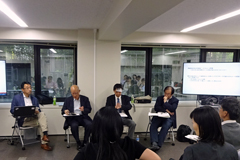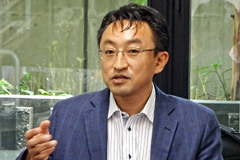'Japan’s Development Cooperation: A Historical Perspective': Research Findings Presented at JASID Conference
2018.07.13
At the 19th Spring Conference of the Japan Society for International Development (JASID) held June 2 in Tokyo, as part of a roundtable entitled "The Puzzle of the History of Japanese Assistance in Southeast Asia," Jin Sato, a visiting fellow at JICA Research Institute and a professor at The University of Tokyo, Yasutami Shimomura, a professor emeritus at Hosei University and Aaron Stephen Moore, an associate professor at Arizona State University, announced some findings for the JICA-RI project "Japan's Development Cooperation: A Historical Perspective."

"The Puzzle of the History of Japanese Assistance in Southeast Asia" was the theme of the discussion
At the beginning, Moore spoke about how in Southeast Asia in the 1950s and '60s, Japan rolled out an integrated development package centered on large-scale infrastructure development such as dam construction. As part of this package, Japan also provided assistance in sectors including industrialization, the promotion of agriculture, regional planning and river improvement. Moore discussed what in Japan's colonial experiences made this integrated development style possible for the Baluchaung hydroelectric development project in what was then Burma. He also talked about Japanese engineers who contributed to the heavy industrial development of Southeast Asia in the prewar period, the lineage of Pan-Asianism and the continuity of human networks.
Next, Shimomura took up two puzzles: 1. Why the anti-Japanese sentiment that spread throughout Southeast Asia in the 1970s and '80s abated around 1990? and 2. Why the ideas of the Fukuda Doctrine, which were lauded in Japan and abroad, did not lead to a softening of anti-Japanese feelings? He reported on how pressure from Southeast Asia changed Japan's diplomatic posture and the state of its development cooperation, and on how, as a result, a Japanese-style development cooperation approach that matches the needs of Southeast Asia came into being. Specifically, this approach refers to comprehensive economic cooperation packages consisting of three parts: assistance, direct investment and importation (opening of markets).
Finally, while asking what we can learn from the history of development cooperation, Sato spoke about the puzzle of why controversial projects that were heavily criticized in the 1980s and '90s seem to receive high marks today after more than 20 years. Sato's findings are based on his visits to the sites of controversial projects funded by Japanese development cooperation. The criticism arose because the dam, irrigation system, power plant and harbor projects in question brought about the forced relocation of residents and environmental pollution, among other problems. He pointed out the importance of analyzing development as long-term processes of change or chains of changes by re-examining a project and what came after it 20 to 30 years after it ended.

Jin Sato, a JICA-RI visiting fellow spoke about what we can learn from the history of development cooperation
After listening to these presentations, discussant Fumiharu Mieno, a professor at Kyoto University, asked how we should evaluate the struggle to find subsequent post-infrastructure assistance or a combination of infrastructure and non-infrastructure approaches. He said he looks forward to continued historical research on the 1960s, which was not covered by the presentations, because it is an important period in relation to Japan's industrialization.
Forty-four people participated in the session, and there were many comments from researchers and consultants, including questions on defining the success or failure of a project, creating guidelines for executing agencies on responding to criticisms of ODA, responding using knowledge accumulation, how criticism of ODA relates to foreign policy including military and defense, and the viewpoint of generational change when discussing continuity or discontinuity before and after 1945.

事業事前評価表(地球規模課題対応国際科学技術協力(SATREPS)).国際協力機構 地球環境部 . 防災第一チーム. 1.案件名.国 名: フィリピン共和国.

事業事前評価表(地球規模課題対応国際科学技術協力(SATREPS)).国際協力機構 地球環境部 . 防災第一チーム. 1.案件名.国 名: フィリピン共和国.

事業事前評価表(地球規模課題対応国際科学技術協力(SATREPS)).国際協力機構 地球環境部 . 防災第一チーム. 1.案件名.国 名: フィリピン共和国.

事業事前評価表(地球規模課題対応国際科学技術協力(SATREPS)).国際協力機構 地球環境部 . 防災第一チーム. 1.案件名.国 名: フィリピン共和国.

事業事前評価表(地球規模課題対応国際科学技術協力(SATREPS)).国際協力機構 地球環境部 . 防災第一チーム. 1.案件名.国 名: フィリピン共和国.
scroll